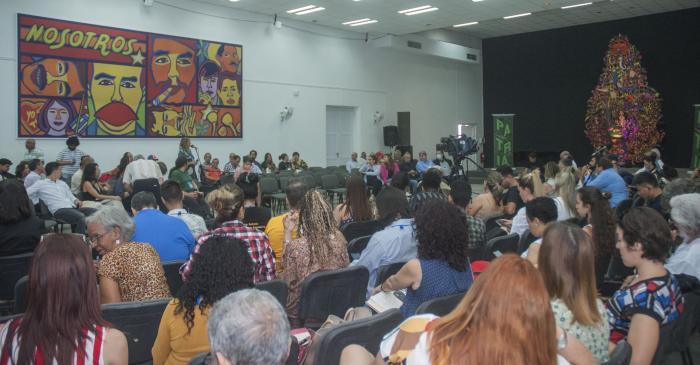
The 2nd International Patria Colloquium concluded on March 14 in Havana, on the occasion of the 131st anniversary of the Patria newspaper founded by the National Hero of Cuba, José Martí with the approval of a final Declaration and the progress towards a consensus on the need to train communicators opposed to imperial hegemony.
At the event, which ran for two days at Casa de las Americas, and which inauguration on March 13 was presided over by the member of the Political Bureau and Secretary of Organization of the Central Committee of the Party, Roberto Morales Ojeda, and Rogelio Polanco Fuentes, member of the Secretariat of the Central Committee and head of its Ideological Department; emerged the proposal to establish a Latin American School of Journalism to train professionals with models of counter-hegemonic practices, capable of designing collaborative campaigns resulting from a teaching from praxis; that is, trained in both thinking and doing.
Likewise, it was proposed to articulate a network that could meet on virtual platforms to evaluate, at least once a month, issues of confrontation to the culture war.
The more than 50 foreign participants from 14 countries and the one hundred Cuban delegates approved the final Declaration of the event, which recognized the damage caused by the criminal economic, commercial and financial blockade to the Cuban people that deprives them of the tools to access new information and communication technologies, but also prevents other peoples of the world from knowing the truth.
"Breaking the blockade is not only a necessity for Cuba, but for International Law, the essential exchange of all countries with an island that, in the face of a global crisis, did everything possible to save its people and help others, sending doctors and vaccines," reads the text, which also calls for strengthening communication networks and promoting public intervention strategies in the face of the proliferation of disinformation campaigns.
It was also agreed to develop a comprehensive program of research and political education to better understand the complex situation of world events, as an indispensable stage in the struggle against imperialism and the ambition of the big information corporations.
The participants in the Colloquium proposed to create structures that empower and make visible young, genuinely Latin American creators; to transcend the spaces of diagnosis and coordinate processes of production and realization of contents; to confront the capitalist media offensive through the construction of a material base and reinvent the communicative codes; to connect at world level with processes that are ignored by the information monopolies, and to achieve systematicity in the follow-up of the proposals that emerge in future events.
They also discussed new strategies of information aggression against Cuba through fake news campaigns and the promotion of hatred in social networks.
The delegates agreed to create an international front made up of political leaders, progressive governments and experts to promote a new world information order in which there is no room for blockades that impede the technological and digital development of the peoples.
As a culmination, it was agreed to generate a course on political communication for the months of April and May, to which organizations present at this event, such as the Union of Journalists of Cuba, the Patria Institute of Argentina, the Lula Institute of Brazil and others, should contribute.
As part of the closing day of the 2nd International Colloquium, participants attended other activities on the occasion of Cuban Press Day, celebrated on March 14, such as the presentation of the José Martí National Journalism Lifetime Awards, held at the National Library.
Translated by ESTI








